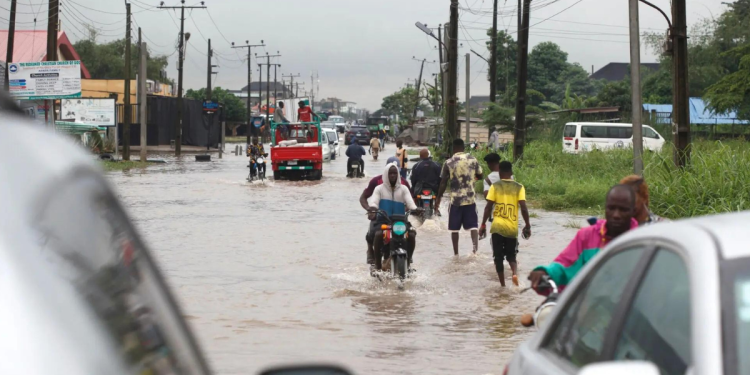The just past rainy season heralded unprecedented flooding and flood-related devastations across Nigeria. According to the Federal Ministry of Humanitarian Affairs and Disaster Management, Nigeria recorded 612 fatalities, 1.43 million homeless, and 874 thousand farmlands and homes were partially or entirely destroyed.
The record also revealed that between June and October, 3.2 million people were affected by widespread flooding across the country.
Of the country’s 36 states, 27, mainly along the Niger and Benue river belts, suffered severe property damage.
Though the flooding and its impact this year were unprecedented, Nigerians have always suffered several consequences of flooding. In 2012, floods damaged 30 out of 36 states, causing 3.8 million people to flee their homes and killing 363 people. The disaster cost N2.6 trillion (about $16.9 billion) in losses and damages.
Though the location of some of the states in the rainforest makes them susceptible to flooding, the impact of the flood would have been significantly reduced if politicians entrusted with the management of the ecological funds had managed it well.
The ecological fund is designed to finance buffers against flooding and other natural disasters. The Fund, established in 1981 through the Federation Account Act, initially constituted 1% of the Federation Account, but in 1992 this was increased to 3%, which is shared among the three tiers of government.
The aim was to devote a pool of money to projects that would alleviate severe environmental problems, including flooding nationwide.
Nigeria’s National Emergency Management Agency (NEMA), founded in 1999 to manage catastrophes in the nation, is in charge of institutional and structural arrangements and “timely relief assistance to victims both at national and international levels.”

The 36 states of the country received a total of N548 billion between 2012 and 2021 for the account’s derivation and ecological fund disbursements to carry out various ecology-related projects, according to information from the monthly Federation Account Allocation Committee (FAAC) reports.
In 2022, sub-national governments have received N21.84 billion in ecological funds.
How have these funds been utilised?
Details culled from Anfani, a civic tech platform that connects procurement data with beneficial ownership transparency, created and maintained by Dataphyte, reveal that ecology-related projects worth an astounding N1.09 trillion have reportedly been linked to various contractors throughout the states.
These projects involve the building or rehabilitation of culverts, dams, drainage systems, and other structures. Despite the volume of contracts, the impact of the latest flood devastation in Nigeria was unprecedented.
Funds disbursed to states as part of the Ecological Fund have been misappropriated by politicians and top government employees, who have turned them into havens for fraud and poor administration.
According to a 2019 report by the Nigeria Extractive Industries Transparency Initiative (NEITI) on the share of derivation and ecology between 2012 and 2016, the theft, embezzlement, and graft of ecological monies extend back many years.
According to the report, the Nigerian Army received N2.5 billion in 2013 from the fund to help relocate and build new barracks. NEITI felt, however, that the grant should not be released for a project like relocation and building a new barrack unless it is to stop the erosion in the old barracks.
Similarly, in 2014 and 2015, the sum of N121.4 million was released for procurement of materials to combat the Ebola Virus outbreak at State Medical Centre, Abuja, and N223.5 million was released to support displaced traditional rulers in the North. The audit report noted that these expenditures do not qualify as costs that the Ecological Fund was created to support.
In 2015, N1.47 billion was diverted by the Gombe, Nasarawa, and Yobe State governments to help cover the cost of damage to public property and places of worship during the 2011 post-election violence. NEITI noted that these expenditures do not qualify as costs that the Ecological Fund was created to support.
In 2018, the Nigerian House of Representatives indicted top government officials and the management of the NEMA over fraud, corruption and embezzlement of the N33 billion Emergency Intervention Fund.
Also, in 2018, Joshua Dariye, ex-governor of Plateau State, was convicted and sentenced to 14 years for money laundering and diversion of funds to private companies and individuals. Part of the fund he embezzled included N1.162 billion from the Ecological Fund meant for the state. He was later granted a state pardon by President Muhammadu Buhari.
In 2021, the Economic and Financial Crimes Commission (EFCC) prosecuted Aliyu Muazu Babaginda, former governor of Niger State, for money laundering after he withdrew N800 million using 80 cheques from the state’s N2 billion Ecological Fund.
In 2022, the House of Representatives launched an investigation into the use of the fund over the previous ten years.
The concept of emergency aid following a disaster is an example of a lack of readiness to handle recurring natural difficulties. It points to the corruption at the root of Nigeria’s weak disaster management system.
This corruption in government is exposing Nigerians to several preventable risks and dangers.
One such is that the flood calamity of 2022 would significantly impact food security. About 3,400km² of land were covered, and crops were devastated. In a nation where mechanised farming is uncommon and insurgent actions have already hampered food production, this has ramifications for food production.
Nigeria’s flooding is also human-induced. Poor urban planning practices and inadequate environmental infrastructure are contributing factors.
Overall, flooding poses a challenge to sustainability since it has a negative impact on the environment, social life, economy, and health. Nigeria’s ability to achieve Sustainable Development Goals is also threatened by flooding.



